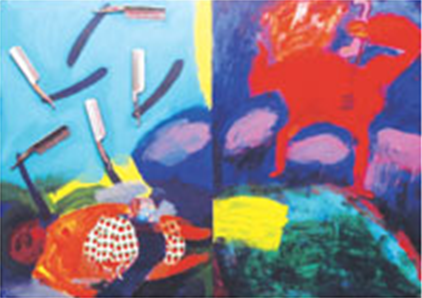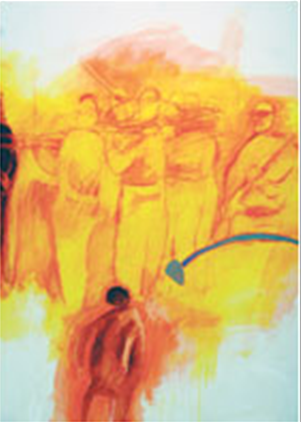Quddus Mirza
This is a collection of articles archived for the excellence of their content. Readers will be able to edit existing articles and post new articles directly |
Quddus Mirza
CAREER IN ART: Colours speak louder than words
Quddus Mirza compels you to study his works by eavesdropping on his interior monologue, writes Peerzada Salman
Before I wax eloquent on Quddus Mirza and his creative pursuits, let me pose a few questions, and, as a prelude to this piece, respond to them.
Does art communicate before it is understood? It sure does, for what good is any work of art if doesn’t hit you where it matters the most? Does that suggest that comprehending art is not as important as getting moved by it? Debatable, perhaps! Do we really ‘appreciate’ Edouard Manet’s ‘The luncheon on the grass’ in the cognitive sense of the word? Not necessarily. And herein lies the magic of all creative endeavours. It works on a level where the ‘heart’ is preferred to the ‘mind’.
Quddus Mirza is an established artist, critic and curator. When such an individual puts his new works on display — at Canvas Gallery, Karachi — you tend to start champing at the bit to come up with a plausible critique on them. But here’s the tricky part: once you start viewing his work, you receive a pleasant surprise: the sensitive being in Mirza eclipses the artist in him. The creature that can ‘feel’ knows the difference between fancy and imagination.
The use of guns and knives as an integral part of his subject matter, and using loud, rather garish colours, clearly suggests that the artist has an agitated soul. And this agitation doesn’t stem from some subjective individualistic streak: it is objective in nature yet highly personalised in form.
To weigh the verity of the argument, take into consideration two out of the eight exhibited pieces: ‘The last supper’ (acrylic on canvas) and ‘Look, book, took’ (acrylic and mixed media on board). They depict, or so I think, the underbelly of society — a society unhinged by disquiet caused by anything ranging from violence and unrest to social disparities. In fact, Mirza becomes pretty over-zealous in making things a tad in-your-face in ‘Look, book, took’ by giving pictures of Bollywood stars. There’s Mithun Chakraborty, there’s Rekha — you name them.
There are even hints of child art, which can readily be construed, if there is a need for it, as innocence lost.
Running the risk of over-interpreting, there’s a way of trying to construct, from the ground up, what’s being deconstructed. Mirza compels you to study his works by eavesdropping on the artist’s interior monologue, that is, the colours that he splashes on to the canvas are first splattered on his heart. Once you get the hang of it, and it’s not important that you do, you start respecting the artist even more.
Colours are a major reference point here. They are brash, if not gaudy, as if the artist is saying ‘that’s the way it is, I can’t help it’. The cacophony that exists in society that he belongs to drowns out the lovey-dovey sounds that sometimes transport you into the world of sweet reverie. Hence the loudness, hence the expansive strokes…
However, you would find it hard not to discern that Mirza has a propensity to overstate his point a weenie bit. Perhaps he finds suggestibility inadequate to put across his deep-seated ideas. And he may not be way off the mark.
Stepping out of the gallery after perusing Mirza’s new works, for some indescribable reason, I felt like reciting three lines written by that inimitable poet/filmmaker Gulzar.
Maut ka aik din mua’yyan hai
Maut ati hai sub pe ati hai
Zindagi sub pe kion nahin ati
(Death is predestined/
Death shall visit all/
And life? No such privileges alas!)
On the cover: The art of deconstruction I, acrylic on canvas
Top: Knife painting, acrylic & mixed media on canvas & board
Left: Manet's shower, acrylic on canvas

